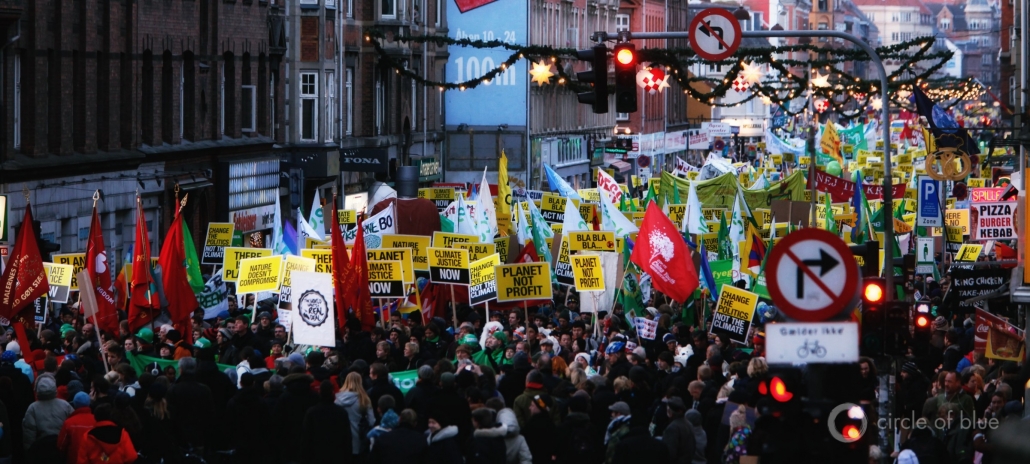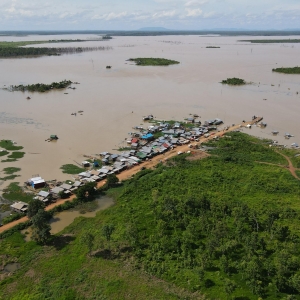Water was overlooked in past global climate talks. Advocates are focusing on the Glasgow meeting to highlight water’s indispensable climate role.

Demonstrators took to the streets at the 2009 global climate convention in Copenhagen. Photo © J. Carl Ganter/Circle of Blue
- Adaptation, reducing greenhouse gas emissions, and accounting for climate damages will be prominent topics at the UN climate convention in November.
- Water groups hope to elevate their issue in Glasgow and bridge the water-climate policy divide.
- Water plays a role in adapting to extreme weather as well as in options for reducing future warming.
By Brett Walton, Circle of Blue – September 15, 2021
When they converge on Glasgow this fall to rekindle pivotal global climate negotiations that were dampened during the pandemic, diplomats and government ministers will confront a world much changed since their last convention.
Covid-19, as it continues to rampage globally, illustrated the gulf in resources available to rich and poor in dealing with environmental stressors. Meanwhile, floods in Germany’s Ahr Valley and wildfires in Greece and the American West showed that no country, rich or poor, is immune to the terrors of a fevered planet, calamities that were summarized in the United Nations’ recent report on climate science.
That report, in the technical language of probabilities and scenarios, underscored the urgency of the moment and the need not only to reduce the release of heat-trapping gases into the atmosphere and limit global warming to 1.5 degrees Celsius, but also to enable communities to live with extreme weather, acidifying oceans, and rising seas that are already occurring.
Events of the past year — torrential floods, exhausting droughts, deadly heat waves — sharpened focus that society must adapt to these climate changes. This recognition is pushing adaptation up the agenda in the weeks preceding the Glasgow meeting, which runs from October 31 to November 12. Some have taken to calling the UN’s 26th climate convention the “adaptation convention.”
“Adaptation is coming of age,” Ban Ki-moon, the former UN secretary-general, said at a Global Center on Adaptation forum last week to rally support before delegates head to Glasgow. Kristalina Georgieva, managing director of the International Monetary Fund, said at the same event that adapting to climate change “needs to be put on equal footing” with reducing emissions.
Water advocates view the attention to adaptation as an opportunity. Water has been relatively neglected in past UN climate conventions, even though the consequences of climate change will largely be felt through deficits and surpluses of water.
Despite intimate connections through droughts and floods, water experts and officials making decisions about responding to climate change are often not in the same room, says Howard Bamsey, chair of the Global Water Partnership, an advocacy and skills-building network. This time around, Bamsey and others are working to shatter the wall.
“We are fully engaged in trying to ensure that the key role of water in climate response is recognized by negotiators and by civil society, business, and activist groups,” Bamsey told Circle of Blue.
Bridging the Gap
GWP is one of many water groups hoping to elevate their issue in Glasgow and bridge the water-climate policy divide. Outside of official negotiations there will be a circus of side events and thematic discussions. A water “pavilion” will serve as a hub for conversation and a way to position water within the climate context, reminding delegates that climate change is water change.
The opportunity is now given that everyone wants to talk about adaptation, nature-based solutions, resilience building.” — Dean Muruven, WWF
Water is important not only for adapting to climate change, said Ingrid Timboe, a co-chair of the water pavilion. It’s also an essential consideration as countries plan to reduce greenhouse gas emissions in line with the goals of the Paris agreement. Removing carbon from the air or growing crops as a fuel stock — two options that will be necessary unless fossil fuel use declines steeply and swiftly — come with significant tradeoffs for water supply and water quality. Both options can increase water use, and biofuel production adds the potential for nutrient pollution of waterways.
By bringing together experts on energy and agriculture at the water pavilion, these are the discussions that Timboe, who is also the policy director at the Alliance for Global Water Adaptation, hopes will cross into the official climate negotiations.
“We’re aiming to highlight work happening on the ground to address mitigation and adaptation and to really push the conversation forward on action, not just on talking, which we do a lot of,” Timboe told Circle of Blue.
The planet is already 1.1 degrees Celsius warmer than pre-industrial times, not far off from the 1.5 degree goal.
For action to take place, there are several gaps to be bridged, Bamsey said. There is no global UN framework for water as there is for other complex environmental problems like climate, desertification, and biodiversity.
“The moment you want to bring water to a political table, there is no political table,” Henk Ovink, the Netherlands’ special envoy for international water, told Circle of Blue.
The sheer number of water groups, focused on everything from local watersheds to global wetlands to utility performance, means that a unified message can be lost in the chatter. And there is the tendency in international meetings that issues remain in sectoral boxes.
Breaking out of boxes is something that Dean Muruven and his colleagues at WWF are positioning themselves to do in Glasgow. Muruven is WWF’s global policy manager for fresh water, and he wants to expand the audience for water.
“We’re less interested in being pigeonholed in the box that WWF would typically be pigeonholed in, and that’s the ministry of environment,” Muruven said, noting that WWF wants meetings with leaders who deal with money – ministers of finance or planning. “We’re trying to think of this as a development priority as opposed to a nature conservation priority.”
If the idea of water as a climate response is still too opaque, WWF is bringing real-world examples that it intends to showcase. One is restoring the Lukanga swamp, an ecosystem that feeds into the Zambezi and is critical for Zambia’s water and energy security. Another is fortifying urban wetlands in Rwanda’s capital Kigali to provide flood protection and green space.
The trick to selling these sorts of projects to government ministers, Muruven said, is to treat them not as environmental work but as planks in a development strategy. Flood-buffering wetlands could guard that new highway from unnecessary damage.
“We’ve taken the conservation benefit and put that secondary,” Muruven explained. “The primary benefit is trying to solve another societal issue that countries have to deal with.”
Funding adaptation projects and accounting for damages from climate change are likely to be a big part of the negotiations in Glasgow. The goal for developing countries is more money for adaptation, said Akinwumi Adesina, president of the African Development Bank Group. In the Paris agreement rich countries said they would contribute $100 billion annually.
Money promised, however, does not always translate into money delivered. Rich countries have offered only a fraction of the $100 billion. Available funds can be difficult to access. The Green Climate Fund was established in 2010 as a means of financing adaptation and emissions reductions in developing countries. A World Resources Institute analysis in March found that out of 62 institutions that had completed their paperwork, only 20 received funding. The analysis found that the application process had resulted in “bottlenecks and frustration.”
Along with these questions about the convention’s content, there are also uncertainties about its form. The unequal distribution of vaccines means that many countries have extremely low vaccination rates. The UK government is strongly recommending that all convention participants be fully vaccinated. An international coalition of climate activist groups asked for the convention to be postponed, but the UK government is pushing ahead. It remains to be seen if capacity limits will restrict the number of people in meeting rooms, which would diminish the chances for collaboration.
Despite these hurdles, water advocates see Glasgow as their best shot for uniting water and climate dialogues that have been running on parallel tracks.
“The opportunity is now given that everyone wants to talk about adaptation, nature-based solutions, resilience building,” Muruven said. “All those things are not new for people working in water. We’re dealing with floods and drought forever. We understand that angle. Bringing that lens to the climate [convention], where in the past we were on the periphery of these decisions, might just get us to the right tables where decisions are being made because we are the people who understand it.”
Brett writes about agriculture, energy, infrastructure, and the politics and economics of water in the United States. He also writes the Federal Water Tap, Circle of Blue’s weekly digest of U.S. government water news. He is the winner of two Society of Environmental Journalists reporting awards, one of the top honors in American environmental journalism: first place for explanatory reporting for a series on septic system pollution in the United States(2016) and third place for beat reporting in a small market (2014). He received the Sierra Club’s Distinguished Service Award in 2018. Brett lives in Seattle, where he hikes the mountains and bakes pies. Contact Brett Walton





